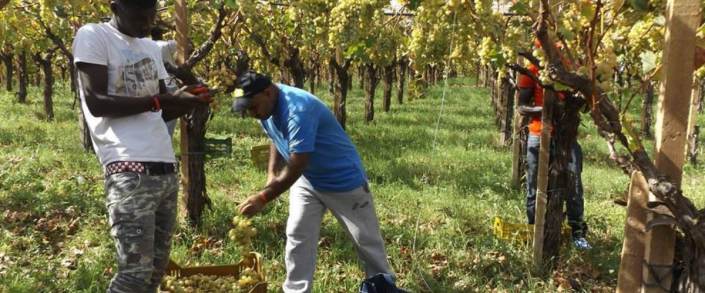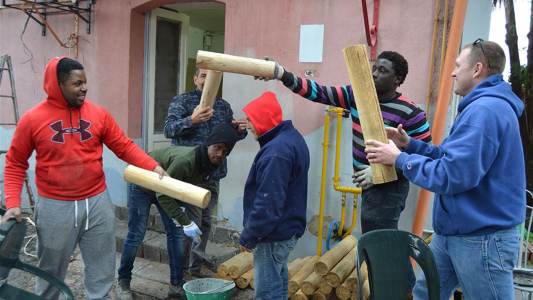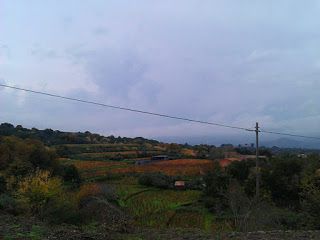Reception system, the new CAS* scattered between hills and mountains of the province. “Migrants increasingly lonely and isolated: this way they can be blackmailed”
After the public call by the prefecture for the entrustment of foreign citizens asking for international protection, centres have opened far away from the cities. “They answer to the logic of hiding people”, Alberto Biondo, representative of Borderline Sicily, denounces: “It is an immigration factory which creates invisible people”.

Photo: Coop. Lavoro e non solo (Facebook)
Castellana, Collesano, Geraci, Isnello, Palazzo Adriano, Ciminna, San Cipirello, Villafrati, Marineo and Godrano: these are only a few municipalities of the Palermo province in which Extraordinary Reception Centres (CAS)* for migrants have opened after the public call by the Palermo prefecture. The public bid for 19 million euros with a troubled pathway – the bid was partly rewritten and started later than announced –has already caused the perplexity of social workers and volunteers who work with the migration phenomenon.
“The CAS* are scattered between hills and mountains – Alberto Biondo from Borderline Sicily states – which corresponds to the logic of hiding people. Old and new cooperatives have opened their doors between a forest and a holiday farm, far away from the residential area.” There are four allotments planned in the bid; one specifically for the city of Palermo and three, theoretically, for the towns of the province. But in fact, the requests which arrived to the prefecture and were approved with a verbal note on the last October 3rd and will regulate until 30 September 2018 “the entrustment of services of reception and assistance of foreign citizens asking for asylum”, rarely concerned individual cities but rather the area around them. The result is that whoever arrives in these places, sooner or later flees from them again: without any point of reference, contact with the local population, or about anything to do, migrants prefer becoming clandestine again. Biondo cites one concrete example. “In Baita del Faggio, which is a mountain shelter in Piano Battaglia , – the social worker says – there is a CAS*: Whoever stays there almost never sees anyone. A lawyer or a psychologist will never go there for their assistance services, because it is not worth the trouble.”
How can this choice of location be explained? Borderline Sicily suggests: “The ones who pay for it are, as always, the migrants who are isolated, it is not just a physical but mainly a social isolation: nobody wants migrants around, and protests start in every city, town or neighbourhood. The latest one was just a few days ago by the inhabitants of the neighbourhood Acquasanta of Palermo who took the streets to block the opening of a CAS* for 80 people assigned to the cooperative La Fenice”. Thus, even in the city the situation does not seem to improve. “The centres which opened in Palermo have the only advantage that they try and offer integration pathways – Biondo continues – but the logic is one of surrender – either due to the constant turnover of employees or because the social workers are often young and not adequately prepared. We are not talking about all cooperatives, of course, but the majority of them works like this: there is a director, two or three attendants and then a few not very specialized people. It is more of a containment than an accompaniment.”
These are the overall working conditions for those who are supposed to offer a service, and this in turn inevitably has consequences for weak subjects who often fled from extreme situations of poverty and war. Borderline Sicily paints a dark picture “Today if I go to work in a cooperative – Biondo adds – I am employed with a contract of 18 hours per week. Afterwards, I find out that I will have to work 40 hours and I also find out that the salary arrives delayed. This way the frustration of the worker continues, and when the Nigerian or Gambian person asks me for the repeated time about the documents, I, myself exploited, will answer him in a bad way. It is a vicious circle.”
In conclusion, “this is a mechanism made ad hoc which serves to create new slaves. As Borderline we have been denouncing for a long time this factory of immigration which creates invisible people without rights, easy to blackmail, who we then need to work in plantations or as caregivers.”
Andrea Turco
*CAS: Centri di Accoglienza Straordinaria, Extraordinary Reception Centres
Translation: Greta Pallaver



